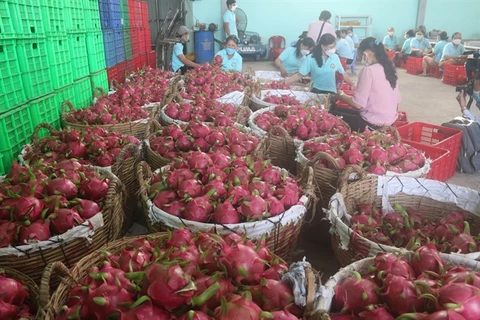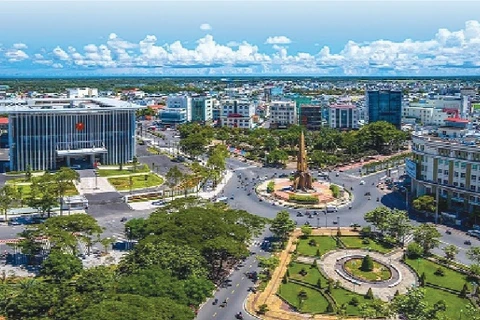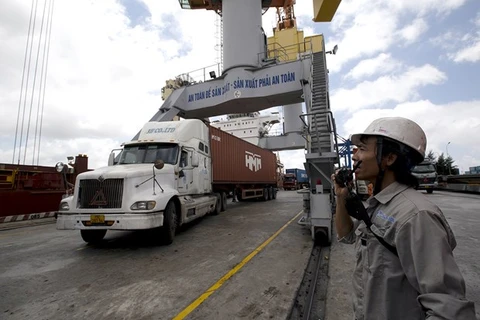 Many Vietnamese businesses modernise production processes to promote their exports. (Photo: VietnamPlus)
Many Vietnamese businesses modernise production processes to promote their exports. (Photo: VietnamPlus) Hanoi (VNA) – Vietnam’s agricultural sector needs to promote green and sustainable production toward increasing the value and competitiveness of farm produce and creating momentum for sustainable exports, said insiders.
Agriculture in Vietnam plays a crucial role in supporting national economic development, while key industrial sectors have gradually regained their positions as growth drivers during the last three quarters.
Efforts to maintain export growth
Vietnam’s gross domestic product (GDP) in the first nine months of this year rose by 4.24% from the same period last year, the General Statistics Office (GSO) has reported.
In the third quarter, the country's economic growth rate was estimated at 5.33% compared to the same quarter of 2022.
In the January-September period, the agro-forestry-fishery sector expanded by 3.72%, contributing 8.03% to the total added value of the entire economy.
Vietnam raked in 19.54 billion USD from exporting farm produce in the period, 16.7% higher than that reported in the same period last year. Of the figure, the export turnover of fruit and vegetables, rice, cashew nut, and coffee products reached 4.2 billion USD, 3.66 billion USD, 2.61 billion USD and 3.16 billion USD, representing yearly rises of 71.8%, 40.4%, 14.3% and 1.9%, respectively.
The positive results were attributed to the increasing demand and efforts to increase the value of exported products to meet stringent standards of import markets.
Vietnam's durian exports hit a record high, reaching 1.2 billion USD in Jan – August, accounting for 30% of the total revenue of fruit and vegetable exports. This accomplishment underscores the growing significance of coding planting areas to meet official export standards in order to access key markets such as China, the US, and the European Union.
According to Secretary General of the Vietnam Fruit & Vegetable Association Dang Phuc Nguyen, September is the time when Central Highlands - the largest durian-cultivation region in the country, begins its harvest season. Meanwhile, in other countries, the durian season is drawing to a close, with limited production or only frozen products available.
Therefore, Vietnam has an even greater opportunity to increase export turnover.
The country’s durian export value is projected to exceed 1.5 billion USD this year.
Meeting high standards for sustainable export
In reality, the competitiveness of Vietnamese goods still remains weak, especially as many countries are imposing stricter technical standards to protect their domestic industries. For this reason, it's essential for Vietnam to continue improving the quality of its products to enhance competitiveness in the global market.
According to Ywert Visser, a member of the Food, Agri & Aqua Business Sector Committee (FAABS) of the European Chamber of Commerce in Vietnam (EuroCham), Vietnam's agricultural exports to the European market have significantly increased since the EU-Vietnam Free Trade Agreement (EVFTA) came into effect in 2020, but mainly concentrating on a few flagship sectors such as coffee and cashew nuts.
This can be a risk if EU consumers change their consumption habits, he noted.
Vietnam’s small-scale agriculture poses a challenge for quality control, market access, and other critical areas, he said, adding that low yields and quality issues, as well as an underdeveloped processing industry, have limited the range of products that can be exported to the EU.
Visser said to increase Vietnam's market share of agricultural products to the EU, businesses need to obtain the GLOBAL GAP certification and adhere to social standards like GRASP and SMETA.
It is necessary to form clusters and cooperatives that allow farmers to collaborate in production and attain a shared organic certification, he said
The expert also underlined the importance for businesses and farms to promote training and support policies on sustainable practices, and monitor compliance with regulations related to the use of chemicals, pesticides, and antibiotics for livestock products, in order to assess detailed impacts./.

























